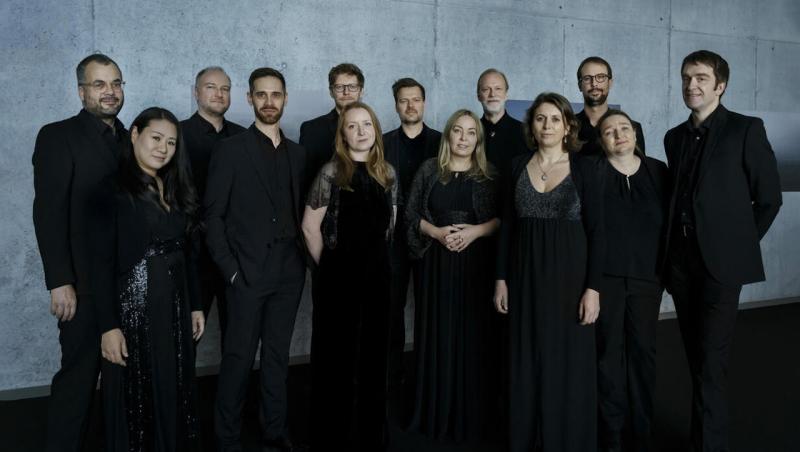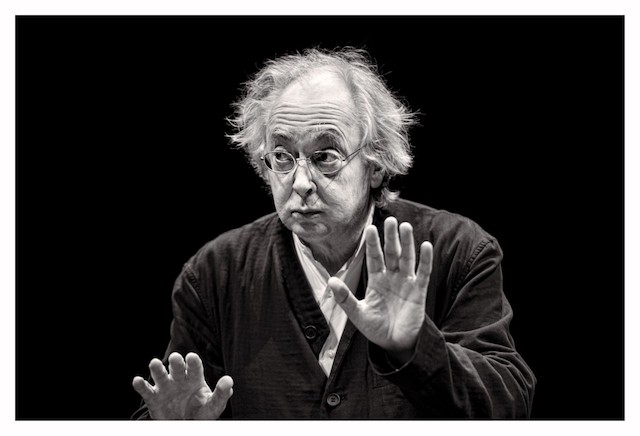Bach's Mass in B Minor, Collegium Vocale Gent, Herreweghe, Barbican - masterful subtlety proves more intriguing than compelling | reviews, news & interviews
Bach's Mass in B Minor, Collegium Vocale Gent, Herreweghe, Barbican - masterful subtlety proves more intriguing than compelling
Bach's Mass in B Minor, Collegium Vocale Gent, Herreweghe, Barbican - masterful subtlety proves more intriguing than compelling
Mathematical elegance as an intrinsic part of Bach's devotion

There’s a masterful subtlety to Philippe Herreweghe’s interpretation of Bach’s last great choral work – it shuns blazing transcendence for a sense of serene contemplation that reveals every angle of the mass’s geometrical perfection. Listening to the multiple layers of sound is rather like appreciating the shifting colours in the inlaid mother of pearl on a harpsichord – nothing dazzles, but it draws you in with its meticulous polish and understated beauty.
Herreweghe has now recorded the Mass in B Minor three times with the Collegium Vocale Gent, and by general consensus it has improved with each recording. The challenge was to make the filigree delicacy of this spiritually intimate interpretation gleam with enough intensity to hold the Barbican Concert Hall.
As in previous performances, Herreweghe chose neither the large-scale choral route nor the Joshua Rifkin-inspired one-to-a-part. Instead he carved the middle route of having three or four singers to each part, with the soloists stepping in and out of the choir. In a nice piece of subtle choreography, none of the soloists sat down when they returned to the choir’s ranks at the end of their solo but remained standing until the rest of the choir stood up to join them.
In the sublimely beautiful opening Kyrie eleison, there was no cutting of the air with the “K”s – instead they were enunciated with a softness that allowed the warmth of the vowels to resonate. The absence of sharp corners or accents instilled a focus on the gentle curves of the interweaving vocal patterns, so that the mathematical elegance was revealed as an intrinsic part of Bach’s devotion.
The sopranos Dorothee Mields and the Czech Hana Blažíková sang for Herreweghe (pictured below) on his last recording of the Mass, and in their duet for the Christe Eleison they showed once more why they are such a complementary pairing. Mields’ mellifluous tones were offset by Blažíková’s more resinous intensity as their voices interplayed like the different elements of an equation.
In the returning Kyrie – sung by the full choir in the form of a fugue introduced by the basses – there was a hypnotic sense of suppleness in the different interweaving lines. Then the warm gold of a trumpet fanfare lifted us into the Gloria.
 The joyful elegance of the 3/8 rhythm contributed to the sense that everything was becoming more buoyant and the colours slightly richer – in the top notes especially there was a beguiling lustre. A particularly vivid moment came with the Domine Deus – introduced with the gentleness of birdsong by Patrick Beuckels on the flute and featuring a wonderful duet between Mields’ soprano and Guy Cutting’s pleasing, carefully modulated tenor.
The joyful elegance of the 3/8 rhythm contributed to the sense that everything was becoming more buoyant and the colours slightly richer – in the top notes especially there was a beguiling lustre. A particularly vivid moment came with the Domine Deus – introduced with the gentleness of birdsong by Patrick Beuckels on the flute and featuring a wonderful duet between Mields’ soprano and Guy Cutting’s pleasing, carefully modulated tenor.
The Qui Tollis then plunged us into shade, with the agitated orchestration bringing a sense of darting light beneath the melancholy. This was swiftly succeeded by an exquisite rendition of the Qui sedes. The movement opened with a yearning oboe solo that led into countertenor Alex Potter’s wonderful rendition of the appeal for mercy, in which the notes soared through the air like shimmering metallic discs.
After the Gloria’s assertive, though ultimately restrained conclusion, we were sent out of the auditorium in reflective mode. The return for the Creed instantly ushered in a more robust approach, in which the assertion of faith – in contrast to the musical direction of “Grave, molto espressivo” became a manifestation of confidence and joy.
The duet for soprano and alto in Et In Unum Dominum heightened the sense of joy, as the singers revelled in the alliterations “Deum de Deo, lumen de lumine”, fleet-footedly tracing the curves of the melodies. Then there was a dramatic shift of tone for the Qui propter, introducing a thrilling sense of the danger that Christ courted when he “descendit de caelis,” (“descended from heaven”). The stern 3/2 Crucifixus moved away from the fluidity that characterised most of the Mass to evoke Christ’s death in stark, severely drawn lines. Then the Et resurrexit brought a blast of sunshine, with featherlight bow work introducing a sense of buoyancy once more.
Following the Et expectio, in which the brass brought the Creed to a warmly resonant conclusion, the choir rearranged itself for the Sanctus and the Agnus Dei. In The Sanctus, the singers created pillars of sound, taking it in turns to emphasise the crotchets “Sanc – tus” as other voices wove triplets around them.
At the moment of singing “Pleni sunt caeli et terra gloria eius” (“Heaven and earth are full of his glory”) there was a real feeling of teeming energy. The evening finished with Potter’s ecstatic delivery of the Agnus Dei, which mined the full anguish of Christ having to take away the sins of the world, before the final prayer for peace.
However, while I left the Barbican feeling I had watched a performance of consummate skill I was also underwhelmed. In a more intimate venue this may have had a greater impact; here while there was an unmistakable sense of watching a master at work, the sense of exquisite elegance ended up constraining as much as it revealed.
rating
Share this article
The future of Arts Journalism
You can stop theartsdesk.com closing!
We urgently need financing to survive. Our fundraising drive has thus far raised £49,000 but we need to reach £100,000 or we will be forced to close. Please contribute here: https://gofund.me/c3f6033d
And if you can forward this information to anyone who might assist, we’d be grateful.

Subscribe to theartsdesk.com
Thank you for continuing to read our work on theartsdesk.com. For unlimited access to every article in its entirety, including our archive of more than 15,000 pieces, we're asking for £5 per month or £40 per year. We feel it's a very good deal, and hope you do too.
To take a subscription now simply click here.
And if you're looking for that extra gift for a friend or family member, why not treat them to a theartsdesk.com gift subscription?
more Classical music
 From Historical to Hip-Hop, Classically Black Music Festival, Kings Place review - a cluster of impressive stars for the future
From quasi-Mozartian elegance to the gritty humour of a kitchen inspection
From Historical to Hip-Hop, Classically Black Music Festival, Kings Place review - a cluster of impressive stars for the future
From quasi-Mozartian elegance to the gritty humour of a kitchen inspection
 Shibe, LSO, Adès, Barbican review - gaudy and glorious new music alongside serene Sibelius
Adès’s passion makes persuasive case for the music he loves, both new and old
Shibe, LSO, Adès, Barbican review - gaudy and glorious new music alongside serene Sibelius
Adès’s passion makes persuasive case for the music he loves, both new and old
 Anja Mittermüller, Richard Fu, Wigmore Hall review - a glorious hall debut
The Austrian mezzo shines - at the age of 22
Anja Mittermüller, Richard Fu, Wigmore Hall review - a glorious hall debut
The Austrian mezzo shines - at the age of 22
 First Person: clarinettist Oliver Pashley on the new horizons of The Hermes Experiment's latest album
Compositions by members of this unusual quartet feature for the first time
First Person: clarinettist Oliver Pashley on the new horizons of The Hermes Experiment's latest album
Compositions by members of this unusual quartet feature for the first time
 Gesualdo Passione, Les Arts Florissants, Amala Dior Company, Barbican review - inspired collaboration excavates the music's humanity
At times it was like watching an anarchic religious procession
Gesualdo Passione, Les Arts Florissants, Amala Dior Company, Barbican review - inspired collaboration excavates the music's humanity
At times it was like watching an anarchic religious procession
 Classical CDs: Camels, concrete and cabaret
An influential American composer's 90th birthday box, plus British piano concertos and a father-and-son duo
Classical CDs: Camels, concrete and cabaret
An influential American composer's 90th birthday box, plus British piano concertos and a father-and-son duo
 Cockerham, Manchester Camerata, Sheen, Martin Harris Centre, Manchester review - re-enacting the dawn of modernism
Two UK premieres added to three miniatures from a seminal event of January 1914
Cockerham, Manchester Camerata, Sheen, Martin Harris Centre, Manchester review - re-enacting the dawn of modernism
Two UK premieres added to three miniatures from a seminal event of January 1914
 Kempf, Brno Philharmonic, Davies, Bridgewater Hall, Manchester review - European tradition meets American jazz
Bouncing Czechs enjoy their Gershwin and Brubeck alongside Janáček and Dvořák
Kempf, Brno Philharmonic, Davies, Bridgewater Hall, Manchester review - European tradition meets American jazz
Bouncing Czechs enjoy their Gershwin and Brubeck alongside Janáček and Dvořák
 Solomon, OAE, Butt, QEH review - daft Biblical whitewashing with great choruses
Even a top soprano and mezzo can’t make this Handel paean wholly convincing
Solomon, OAE, Butt, QEH review - daft Biblical whitewashing with great choruses
Even a top soprano and mezzo can’t make this Handel paean wholly convincing
 Two-Piano Gala, Kings Place review - shining constellations
London Piano Festival curators and illustrious friends entertain and enlighten
Two-Piano Gala, Kings Place review - shining constellations
London Piano Festival curators and illustrious friends entertain and enlighten
 Echo Vocal Ensemble, Latto, Union Chapel review - eclectic choral programme garlanded with dance
Beautiful singing at the heart of an imaginative and stylistically varied concert
Echo Vocal Ensemble, Latto, Union Chapel review - eclectic choral programme garlanded with dance
Beautiful singing at the heart of an imaginative and stylistically varied concert
 Scott, Irish Baroque Orchestra, Whelan, RIAM, Dublin review - towards a Mozart masterpiece
Characteristic joy and enlightenment from this team, but a valveless horn brings problems
Scott, Irish Baroque Orchestra, Whelan, RIAM, Dublin review - towards a Mozart masterpiece
Characteristic joy and enlightenment from this team, but a valveless horn brings problems

Add comment